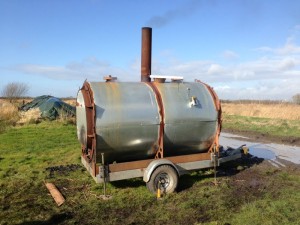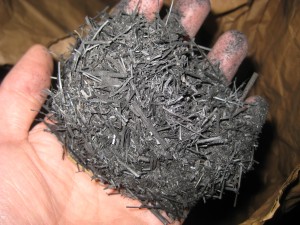DECC Wetlands Biomass to Bioenergy Competition
Crops for Energy is delighted to be involved with a consortium looking at innovative ways to deal with biomass produced from wetlands management. The project is supported by the the Department of Energy and Climate Change (DECC’s ) £2 million wetlands biomass to bioenergy competition and aims is to provide an end to end process that embraces the necessity for low impact working practices in and around these environmentally sensitive habitats.
The project is headed by the Carbon Compost Company and involves the harvest of wetland biomass (e.g. reed, rush, willow and alder) and its pyrolisation into charcoal using the Exeter retort. The charcoal produced will be transported to the Department of Chemical and Process Engineering at the University of Sheffield for tests in their Ultra-Superheated Steam (USS) gasifier. The machine will gasify the char to produce clean syngas which will be used to produce electricity. We anticipate that this system could be used for small to medium size installations around 10-50 kilowatts (kWe).
Phase 1 of the project will involve various tests to refine the performance of Loglogic’s Softrak reaper binder harvester, the retort and the gasifier. In addition, a desk study will be carried out to evaluate the economic and practical logistics of this solution. If the tests are successful and the project is shown to be feasible and stack up financially then we hope to be invited to develop the system further in Phase 2 of the project. The intention will be to develop a 10-20 kWe prototype gasification system, scale up the retort to increase processing efficiency and modify the harvesting system.
Wetland biomass is an important resource as it is already harvested routinely from the Somerset Levels and Moors and the Broads/Fens in Suffolk but currently has no market. Reeds and rushes and other wetland biomass could provide a sustainable, fast-growing source of energy that does not impact on food production. Government projections suggest that sustainably-sourced biomass such as this could provide up to 11% of the UK’s primary energy supplies by 2020.Crops for Energy wrote the bid on behalf of the consortium and are in charge of co-ordinating the desk study in phase 1 of the project. This will focus on the
- Biomass supply chain and transport logistics
- Regulatory requirements
- Detailed mass and energy balances of the process
- Carbon and energy life cycle assessment (LCA )
- Emissions produced during the energy generation process
- Economics and cost analysis
- Exploitation plans
For more information on other successful bidders follow this link.

